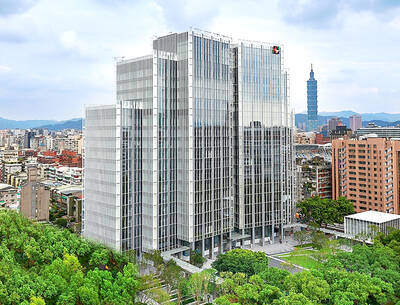LaSalle Investment Management, a unit of the world's second-largest commercial real estate broker, said it plans to triple its investments in Asia to US$20 billion from US$7 billion in the next three to four years.
The company plans to invest in markets such as Japan, China, Hong Kong, Taiwan, South Korea, Singapore, Thailand, Australia and New Zealand, said Jack Chandler, LaSalle Investment Management's chief executive officer in the Asia-Pacific.
"Our Asian funds have outperformed our internal rate of return of about 18 to 20 percent, and have done better than other regions" in the past three to four years, Chandler said in an interview in Singapore yesterday. "Investors have to have international real estate in their portfolio."
More than 100 real estate funds may raise a record US$69 billion this year as investors seek better returns than stocks and bonds provide, according to Private Equity Intelligence Ltd.
Morgan Stanley raised a record US$8 billion for a real estate investment last month, after announcing in April it was buying All Nippon Airways Co's 13 Japanese hotels in the country's biggest real estate purchase by an overseas investor.
LaSalle, a unit of Chicago-based Jones Lang LaSalle Inc, manages more than US$44 billion in real estate assets. The company began investing in Asia in 2000 and has six regional funds. Japan accounts for most of its investments in the region and will continue to be its biggest market, Chandler said.
"There's an unprecedented amount of liquidity directed at Asia, and we will continue to see funds flowing in, especially for Japan as the economy recovers there," said Simon Smith, head of research at Savills Hong Kong Ltd, a real estate consulting company.
LaSalle has two logistics funds in Japan, where the company developed and invested in warehouses for the past five to six years, Chandler said.
"A large part of it is because of the substantial investments that Japanese companies have made in moving their production to China,"he said. "Those goods have to be brought back to Japan and also moved elsewhere."
Japan's commercial real estate market, the second largest in the world after the US, is recovering from a 15-year slump that reduced the value of properties by as much as 75 percent. Rental income yields are still higher than the cost of borrowing, even as interest rates will most certainly go up, Chandler said.
LaSalle is ninth-largest property fund manager in the world, according to a survey last year by the European Association for Investors in Non-listed Real Estate Vehicles and Europroperty magazine.

UNCERTAINTY: Investors remain worried that trade negotiations with Washington could go poorly, given Trump’s inconsistency on tariffs in his second term, experts said The consumer confidence index this month fell for a ninth consecutive month to its lowest level in 13 months, as global trade uncertainties and tariff risks cloud Taiwan’s economic outlook, a survey released yesterday by National Central University found. The biggest decline came from the timing for stock investments, which plunged 11.82 points to 26.82, underscoring bleak investor confidence, it said. “Although the TAIEX reclaimed the 21,000-point mark after the US and China agreed to bury the hatchet for 90 days, investors remain worried that the situation would turn sour later,” said Dachrahn Wu (吳大任), director of the university’s Research Center for

Alchip Technologies Ltd (世芯), an application-specific integrated circuit (ASIC) designer specializing in artificial-intelligence (AI) chips, yesterday said that small-volume production of 3-nanometer (nm) chips for a key customer is on track to start by the end of this year, dismissing speculation about delays in producing advanced chips. As Alchip is transitioning from 7-nanometer and 5-nanometer process technology to 3 nanometers, investors and shareholders have been closely monitoring whether the company is navigating through such transition smoothly. “We are proceeding well in [building] this generation [of chips]. It appears to me that no revision will be required. We have achieved success in designing

PROJECTION: KGI Financial said that based on its foreign exchange exposure, a NT$0.1 increase in the New Taiwan dollar would negatively impact it by about NT$1.7 billion KGI Financial Holding Co (凱基金控) yesterday said its life insurance arm has increased hedging and adopted other moves to curb the impact of the local currency’s appreciation on its profitability. “It is difficult to accurately depict the hedging costs, which might vary from 7 percent to 40 percent in a single day,” KGI Life Insurance Co (凱基人壽) told an investors’ conference in Taipei. KGI Life, which underpinned 66 percent of the group’s total net income last year, has elevated hedging to 55 to 60 percent, while using a basket of currencies to manage currency volatility, the insurer said. As different

Taiwanese insurers are facing difficult questions about the damage of recent swings in the New Taiwan dollar. Regulators might have a partial solution: letting firms change how they calculate the value of foreign currency assets. The Financial Supervisory Commission (FSC) is considering allowing insurers to use six-month average exchange rates when they calculate risk-based capital in their semiannual reports, a shift from the current system where insurers use exchange rates on the final day of reporting. The change could ease pressure on the US$1.2 trillion insurance sector, whose huge exposure to foreign assets came into the spotlight earlier this month after a